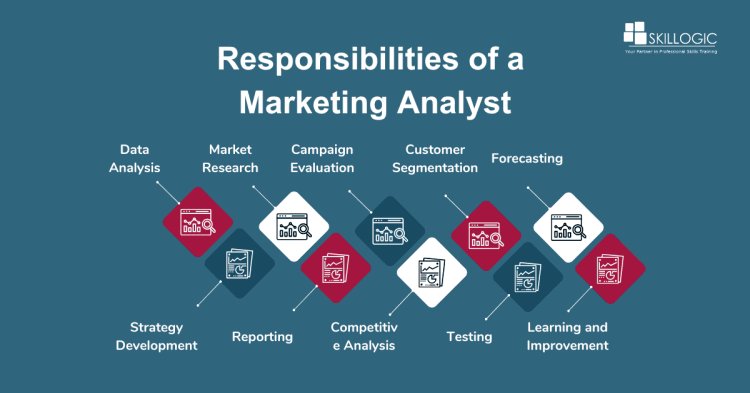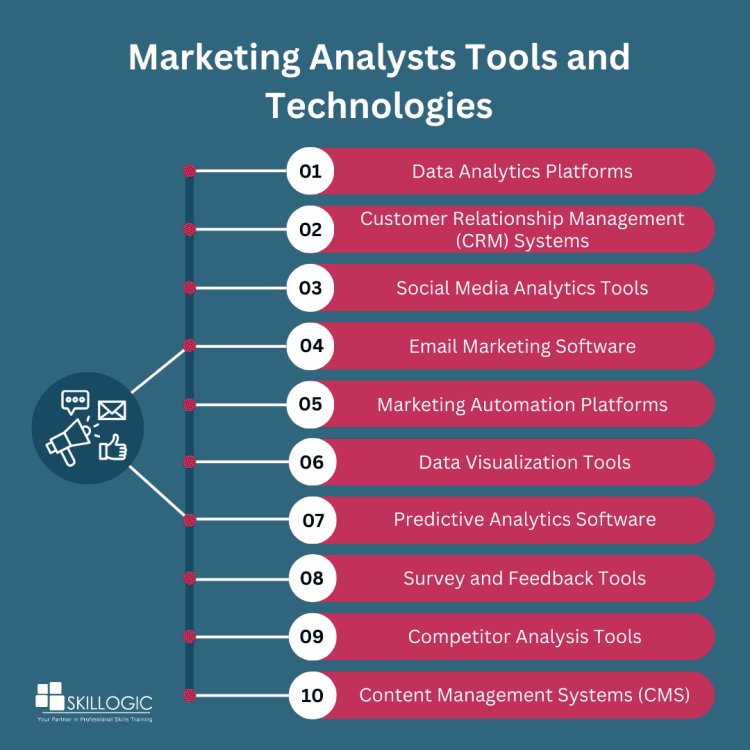Understanding What a Marketing Analyst Does
Discover the key responsibilities of a Marketing Analyst, including data analysis, market research, and strategy development to drive business growth. Learn how they interpret trends and consumer behavior to optimize marketing campaigns.

Meet the brains behind successful marketing strategies: Marketing Analysts. In this article, we'll explore the fascinating world of Marketing Analysts and uncover their pivotal role in driving business success. Get ready to discover how these experts shape effective marketing campaigns and unlock key insights to propel companies to new heights!
Who are Marketing Analysts
According to Mordor intelligence, the Marketing Analytics Market is projected to be valued at USD 6.31 billion in 2024 and is anticipated to grow to USD 11.54 billion by 2029, with a compound annual growth rate (CAGR) of 12.84% during the forecast period from 2024 to 2029.
Marketing Analysts are like detectives in business, investigating how people behave and what trends are happening in the market. They look at lots of information to find important clues that help companies understand who their customers are and how to beat their competitors. By studying market trends carefully, Marketing Analysts help businesses create marketing plans that really connect with customers and make the business grow.
Understanding marketing is super important for businesses. With the help of Marketing Analysts, companies can use data to make smart decisions, spend money wisely, and get the most out of their investments. These analysts make sure businesses can keep up with changes in the market, find new opportunities, and stay ahead of their rivals in the ever-changing world of business.
Read these articles:
- Identifying the Role of an Information Security Analyst
- Business Analytics in Supply Chain Management
- Strategic HR Decision-Making Through Business Analytics

Responsibilities of a Marketing Analyst
A Marketing Analyst plays a key role in helping businesses make informed decisions about marketing strategies. They gather, analyze, and interpret data related to consumer behavior, market trends, and campaign performance, which helps optimize marketing efforts. Equipped with business analyst training, they are skilled in leveraging advanced analytical tools and methodologies to provide deeper insights into data, enhancing their ability to identify opportunities, forecast trends, and recommend data-driven strategies that align with business goals. Here are the core responsibilities of a Marketing Analyst:
- Data Analysis: Gather and analyze data from various sources to understand market trends and consumer behavior.
- Market Research: Study competitors, target audiences, and industry trends to guide marketing strategies.
- Campaign Evaluation: Measure the effectiveness of marketing campaigns by tracking key metrics like sales and customer engagement.
- Customer Segmentation: Group customers based on factors like age, interests, and buying habits to personalize marketing efforts.
- Forecasting: Use data analysis techniques to predict future sales and marketing outcomes.
- Strategy Development: Work with marketing teams to create plans based on data-driven insights and market research.
- Reporting: Present findings and insights to team members and stakeholders using clear reports and visual aids.
- Competitive Analysis: Keep an eye on competitors' marketing strategies and products to stay ahead in the market.
- Testing: Experiment with different marketing approaches to see what works best for the target audience.
- Learning and Improvement: Stay updated on industry trends and use feedback to refine marketing strategies for better results.
Educational Background and Skills Required for Marketing Analysts
To become a successful marketing analyst, a solid educational background combined with specific analytical, technical, and communication skills is essential. Here’s an overview:
A. Academic Qualifications:
- Completing a bachelor's degree in fields like marketing, business, economics, or statistics is often necessary.
- For higher-level roles, some employers may favor candidates who hold a master’s degree.
B. Technical Skills:
- Proficiency in using tools like Microsoft Excel for data analysis and interpretation.
- Knowledge of data visualization software such as Tableau or Power BI.
- Familiarity with statistical analysis software like SPSS or R for data modeling.
C. Soft Skills:
- Strong communication skills to effectively convey findings and insights to team members and stakeholders.
- Applying analytical thinking to interpret intricate data and extract insightful conclusions.
- Meticulous focus on detail to guarantee precision in data analysis and reporting.
- Skilled in collaborating and working effectively within cross-functional teams to achieve shared goals.
Read these articles:
- Who is a Business Analyst
- How to become a Business Analyst in India
- Business Analytics Scope in India

Tools and Technologies Used by Marketing Analysts
Marketing analysts use a wide range of tools and technologies to gather, analyze, and interpret data, develop insights, and optimize marketing strategies. These tools span data analytics, customer relationship management (CRM), social media, SEO, automation, and visualization. Here’s a breakdown of the main categories and examples:
- Data Analytics Platforms: Marketing analysts utilize data analytics platforms such as Google Analytics, Adobe Analytics, or HubSpot to gather and analyze data related to website traffic, user behavior, and campaign performance.
- Customer Relationship Management (CRM) Systems: CRM systems like Salesforce or Zoho CRM are used to manage customer data, track interactions, and analyze customer behavior to personalize marketing efforts.
- Social Media Analytics Tools: Tools like Sprout Social, Hootsuite, or Buffer provide insights into social media engagement, audience demographics, and campaign performance across various social media platforms.
- Email Marketing Software: Email marketing platforms such as Mailchimp, Constant Contact, or Campaign Monitor help track email campaign metrics, including open rates, click-through rates, and conversions.
- Marketing Automation Platforms: Platforms like Marketo, HubSpot, or Pardot automate marketing tasks, segment audiences, and track campaign performance to optimize marketing efforts.
- Data Visualization Tools: Visualization tools like Tableau, Power BI, or Google Data Studio are used to create interactive dashboards and reports that visually represent marketing data for easy interpretation.
- Predictive Analytics Software: Predictive analytics tools like IBM Watson, SAS Predictive Analytics, or RapidMiner enable marketers to forecast future trends, identify potential opportunities, and make data-driven decisions.
- Survey and Feedback Tools: Tools such as SurveyMonkey, Qualtrics, or Typeform allow marketers to gather customer feedback, conduct market research, and collect data for analysis.
- Competitor Analysis Tools: Competitor analysis tools like SEMrush, Ahrefs, or SimilarWeb help marketers track competitors' online presence, keywords, and advertising strategies to benchmark performance and identify opportunities.
- Content Management Systems (CMS): CMS platforms like WordPress, Drupal, or Joomla are used to manage and optimize website content, track website performance, and analyze visitor behavior for marketing insights.
Career Path and Growth Opportunities for Marketing Analysts
Marketing analysts play a critical role in shaping business strategies by gathering and interpreting data to understand customer behavior, market trends, and campaign effectiveness. A career as a marketing analyst offers multiple pathways and growth opportunities, depending on the individual’s skills, interests, and professional goals. Additionally, pursuing a business analyst course can enhance a marketing analyst's skill set, equipping them with valuable tools for analyzing business processes and improving decision-making. Here’s an overview of a typical career path and potential growth opportunities for marketing analysts:
A. Entry-Level Positions:
Aspiring marketing analysts typically start in entry-level positions, where they assist with data collection, analysis, and report generation under the supervision of senior analysts or managers.
B. Mid-Level Positions:
Mid-level marketing analysts take on more responsibility, leading data analysis projects, conducting market research, and providing insights to support marketing strategies. They may also supervise junior analysts and collaborate with other departments.
C. Senior-Level Positions:
Senior marketing analysts hold leadership roles, overseeing strategic initiatives, guiding the development of marketing campaigns, and making high-level decisions based on data-driven insights. They may also mentor junior staff and represent the marketing analytics team at executive meetings.
D. Advancement Opportunities - High Salaries:
With experience and expertise, marketing analysts can advance to lucrative positions with higher salaries. They may transition into roles such as marketing analytics managers, directors, or consultants, where they have greater responsibility and influence in driving business success.
- In India, marketing analysts earn an average salary of ₹5,50,096 per year, according to Glassdoor.
- Glassdoor reports that marketing analysts in the United States earn an average salary of $75,639 per year.
- In the United Kingdom, the average market analyst salary is £33,091 per year, as reported by Indeed.
- Glassdoor states that marketing analysts in Canada earn an average salary of CA$64,344 per year.
- Talent.com notes that the average marketing analyst salary in South Africa is ZAR 540,006.
- The average salary for marketing analysts in Australia is AUD 100,980 per year, according to Talent.com.
- Payscale reports that marketing analysts in the United Arab Emirates earn an average salary of AED 177,000.
Refer these articles:
- Business Analyst Course Fees
- Business Analytics Training Fees in Ahmedabad
- Business Analytics Course Fee in Hyderabad
Marketing analysts are like detectives for businesses. They study how people behave, what they like, and trends in the market. By looking at lots of data, they help companies make smart decisions about marketing. Their job is to figure out what works and what doesn't in marketing, helping businesses grow and succeed.
SKILLOGIC Training Institute offers aspiring professionals exceptional opportunities to enhance their skills through specialized certification courses in PMP, PRINCE2, Six Sigma, Cybersecurity, Business Analytics, and more. With a distinguished track record of over a decade, SKILLOGIC® has established itself as a global leader in the training industry, serving a diverse international community of 100,000+ learners. Boasting more than 25 accreditations and partnerships, as well as a dedicated team of 100+ expert instructors, SKILLOGIC provides unparalleled pathways for both professional advancement and personal growth.
SKILLOGIC Institute offers aspiring professionals exceptional opportunities to enhance their skills through specialized certification courses in PMP, PRINCE2, Six Sigma, Cybersecurity, Business Analytics, and more. With over a decade of excellence, SKILLOGIC has established itself as a global leader in the training industry, serving a diverse international community of more than 100,000 learners.

0
216